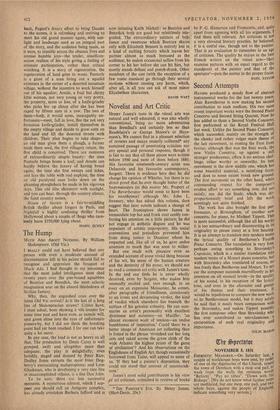Second Attempts
HAVING produced a steady flow of abstract instrumental works for the last twenty years, Alan Rawsthorne is now making his second contribution to each medium. His two most recent important works were the Second Piano Concerto and Second String Quartet. Now he has added to them a Second Violin Concerto, first performed at the Royal Festival Hall last week. Unlike the Second Piano Concerto, which succeeded, mainly on the strength of the cheeky and rather vulgar main theme of the last movement, in ousting the First from favour, although that was the finer work, the new Violin Concerto, up against a still stronger predecessor, offers it no serious chal- lenge, either worthy or unworthy. Its best movement is the slow middle one, which has some beautiful material, a satisfying form, and does to some extent break new ground. The first movement on the other hand, while commanding respect for the composers evident effort to say something new, did not satisfy, nor did the finale, which was dis- proportionately brief and left the work seemingly not quite finished. The week has also brought the first per formance, at Birmingham, of another neW concerto, for piano, by Michael Tippett. This is more successful, although like all his works it is too extraordinary and disconcerting in its originality to please many at a first hearing. It is an attempt to translate into modern terms the lyrical quality of Beethoven's Fourth Piano Concerto. The translation is very free, perhaps owing something to Stravinsky s Capriccio, which is a similar translation into modern terms of a Mozart piano concerto, but with Stravinsky also translated of course, no less freely than Beethoven and Mozart. To [IV ear the composer succeeds marvellously in Ms intention on all musical levels—in the quality of his sound, in his recapture of the lyrical tone, and even in the character and genius of his themes and their treatment. It would be injudicious to compare the new work to its Beethovenian model, but it may safelY be said that it easily bears comparison with the Stravinsky, and makes Tippett possiblY the first composer other than Stravinsky who has ever contributed to neo-classicism a, composition of such real originality and importance.
COLIN MASON


































 Previous page
Previous page